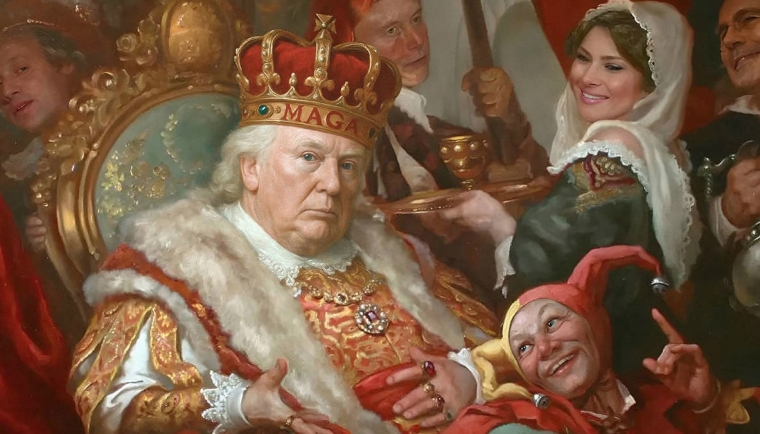
In the Middle Ages, it was often the court jester who dared to speak uncomfortable truths to the king. In the ersatz court of US President and aspiring monarch Donald Trump, that role belongs to the bond market.
As Trump’s “big, beautiful” tax and spending bill barrels toward passage by Congress, it is abundantly clear that it will do nothing to rein in the 6.4%-of-GDP fiscal deficit recorded under his predecessor, Joe Biden, in 2024. On the contrary, Trump’s budget likely presages deficits totaling 7% of GDP or more for the remainder of his term – barring major shocks like a pandemic, financial crisis, or war, any of which could push deficits even higher.
International investors have long had a seemingly insatiable appetite for US Treasuries, widely regarded as the ultimate safe haven. But with federal government debt at 122% of GDP – and a large portion of it due to be rolled over in the coming months – that appetite may not last much longer. The 30-year US bond yield is hovering around 5%, and the ten-year rate is around 4.5%, both up roughly two percentage points from a decade ago. Consequently, interest payments on existing debt are soaring and have already surpassed defense spending.
By now, it should be obvious that those who treated debt as a free lunch with little or no consequences for long-term growth were ignoring basic economic realities. As I have long argued, interest-rate normalisation was inevitable. No one should have assumed that ultra-low rates would last indefinitely, let alone bet the country’s economic future on that assumption.
This reality has finally sunk in even among the most fanatical debt deniers. So why hasn’t it registered with Trump, who – at least during his first term – was generally an economic pragmatist, willing to change course when his policies failed to deliver?
The answer is that Trump is also a political realist. He understands that the American public is simply not ready to accept anything resembling “austerity” – the term progressives use whenever someone suggests there may be a trade-off between the short-term benefits of debt-financed stimulus and its long-term costs.
Trump and his acolytes argue that his “big, beautiful bill” will supercharge economic growth, generating enough revenue to make up for sweeping tax cuts. But history offers little support for such claims. While both Democratic-led spending sprees and Republican-backed tax cuts have fueled the growth of US debt over the past two decades, tax reductions have accounted for the lion’s share of the increase. Moreover, the notion that tax cuts pay for themselves was already discredited in the 1980s, when President Ronald Reagan’s tax cuts led to soaring deficits rather than self-sustaining growth.
Will America’s rising debt ultimately trigger a full-blown crisis? Perhaps, but a continued upward drift in long-term interest rates is more likely. Trump won’t fix the problem by pressuring the Fed to cut short-term rates. Unless the economy falls into a recession, the Fed has little room to cut without stoking inflation – and higher inflation would only accelerate the rise in long-term rates.
Rising real interest rates are fueled by ballooning global debt, geopolitical instability, growing military expenditures, the fracturing of multilateral trade, the energy demands of AI, and populist fiscal policy. While countervailing forces like inequality and demographics may exert some downward pressure on rates, they are unlikely to offset these structural and political factors anytime soon. Inflation expectations are also bound to rise if governments appear unable or unwilling to bring debt under control.
Another factor that could boost interest rates, particularly in the United States, is Trump’s push to close off the domestic economy. After all, persistent trade deficits are typically matched by the inflows of foreign capital that help finance them. But if those inflows shrink, interest rates will rise even further.
To be sure, this isn’t just about Trump. Interest rates were already rising sharply during Biden’s term. Had Democrats won the presidency and both houses of Congress in 2024, America’s fiscal outlook would probably have been just as bleak. Until a crisis hits, there is little political will to act, and any leader who attempts to pursue fiscal consolidation runs the risk of being voted out of office.
But what form might such a crisis take? As I explain in my recent book Our Dollar, Your Problem, the answer depends on the nature of the shock that triggers it and how the government responds. Will Trump resort to growth-stifling financial repression, as Japan – and, to a lesser extent, Europe – have done? Or is another bout of inflation more likely? Either way, bond investors are sounding the alarm: Trump’s “big, beautiful” debt will ultimately harm both the US economy and the dollar. Uncomfortable as it may be, this is a truth he cannot afford to ignore.
*Kenneth Rogoff, a former chief economist of the International Monetary Fund, is Professor of Economics and Public Policy at Harvard University and the recipient of the 2011 Deutsche Bank Prize in Financial Economics. He is the co-author (with Carmen M. Reinhart) of This Time is Different: Eight Centuries of Financial Folly (Princeton University Press, 2011) and the author of Our Dollar, Your Problem (Yale University Press, 2025). Copyright: Project Syndicate, 2025, and published here with permission.

We welcome your comments below. If you are not already registered, please register to comment
Remember we welcome robust, respectful and insightful debate. We don't welcome abusive or defamatory comments and will de-register those repeatedly making such comments. Our current comment policy is here.